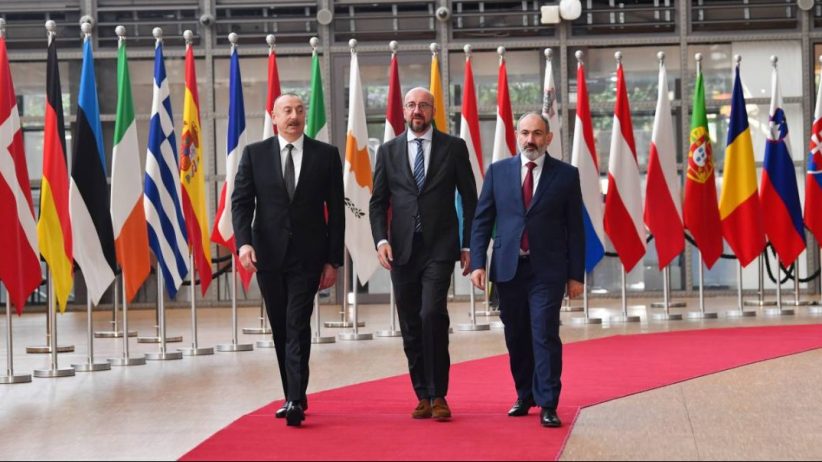By Mark Dovich
European Council President Charles Michel issued a statement late Tuesday evening aimed at clarifying the EU’s position on ongoing Karabakh negotiations, as Armenia and Azerbaijan continued to trade accusations of undermining normalization efforts and violating the ceasefire.
Michel stressed in his statement that “all core issues that led to the first Nagorno-Karabakh war as well as to the renewed hostilities in 2020 will need to be addressed by all stakeholders to create conditions for lasting and equitable peace.”
As of late, Brussels has been playing an increasing role as a mediator between Armenia and Azerbaijan, with Michel brokering meetings between Armenian Prime Minister Nikol Pashinyan and Azerbaijani President Ilham Aliyev twice in the last two months.
Michel’s meetings already appear to be bearing fruit. Last week, Armenia and Azerbaijan agreed to create a long-discussed joint commission on border delimitation and security. The commission is planning to convene this week in Moscow, but the date for that meeting still has not been announced.
At the same time, Yerevan and Baku have issued dueling press releases almost daily since late last week, underscoring just how much daylight remains between the two sides, even as they both say they are committed to peace talks.
Each side has accused the other of deliberately taking steps to undermine ongoing efforts to normalize relations, and has also denied the other’s allegations of violating the November 2020 ceasefire agreement along the border.
Over the weekend, a young Armenian soldier died of injuries sustained after Azerbaijani troops opened fire on Armenian positions at the border, according to the Armenian Defense Ministry.
In his statement, Michel specifically mentioned that “both parties confirmed there were no extraterritorial claims with regard to future transport infrastructure,” adding that “speculation to the contrary is regrettable.”
In a lengthy speech Friday, Aliyev reiterated that he wishes to open a “corridor” across Armenia to connect mainland Azerbaijan with the Nakhichevan exclave as part of efforts to unblock transport connections in the region.
The Armenian government has repeatedly rejected the possibility that an overland transport route through Armenian territory would constitute a corridor, arguing that the terminology implies Azerbaijani government control over the passage.
Aliyev also made reference to Syunik, the southern Armenian region through which such a route would run, as “our ancient land of Western Zangazur.”
“Are we making a territorial claim against Armenia? We are not,” he said. “But if they are going to make a territorial claim against us, why shouldn’t we?”
Aliyev’s comments provoked much controversy in Armenia and prompted both the Armenian Foreign Ministry and Foreign Minister Ararat Mirzoyan to issue rebuttals.
Michel also took pains to note in his press release that “terminology is particularly sensitive” and urged that his comments “should not be interpreted as favouring a pre-determined outcome of discussions either way.”
Michel’s inclusion of the phrase “the ethnic Armenian population in Karabakh” in a previous statement late last month attracted much attention in Armenia, where it was widely seen as a tacit recognition of Baku’s claims over Karabakh.
In a column for CivilNet, noted Karabakh analyst Tigran Grigoryan said that “Michel’s use of the term ‘Karabakh’ instead of ‘Nagorno-Karabakh’ is not accidental,” arguing that “the use of the term ‘Karabakh’ corresponds to Azerbaijan’s position.”
Toivo Klaar, the EU special representative for the South Caucasus, will visit the region in the coming days, Michel also announced Tuesday.
















